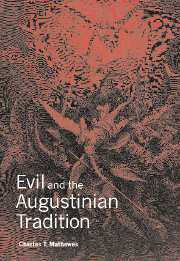Book contents
- Frontmatter
- Contents
- Acknowledgments
- List of abbreviations
- Introduction: reaching disagreement
- I PRELIMINARIES: EVIL AND THE AUGUSTINIAN TRADITION
- II GENEALOGY: REMEMBERING THE AUGUSTINIAN TRADITION
- 3 Sin as perversion: Reinhold Niebuhr's Augustinian psychology
- 4 Evil as privation: Hannah Arendt's Augustinian ontology
- III THE CHALLENGE OF THE AUGUSTINIAN TRADITION TO EVIL
- Conclusion: realizing incomprehension, discerning mystery
- Works cited
- Index
4 - Evil as privation: Hannah Arendt's Augustinian ontology
Published online by Cambridge University Press: 22 September 2009
- Frontmatter
- Contents
- Acknowledgments
- List of abbreviations
- Introduction: reaching disagreement
- I PRELIMINARIES: EVIL AND THE AUGUSTINIAN TRADITION
- II GENEALOGY: REMEMBERING THE AUGUSTINIAN TRADITION
- 3 Sin as perversion: Reinhold Niebuhr's Augustinian psychology
- 4 Evil as privation: Hannah Arendt's Augustinian ontology
- III THE CHALLENGE OF THE AUGUSTINIAN TRADITION TO EVIL
- Conclusion: realizing incomprehension, discerning mystery
- Works cited
- Index
Summary
Take but degree away, untune that string,
And hark what discord follows. Each thing meets
In mere oppugnancy. The bounded waters
Should lift their bosoms higher than the shores
And make a sop of all this solid globe;
Strength should be lord of imbecility,
And the rude son should strike his father dead;
Force should be right; or rather, right and wrong,
Between whose endless jar justice resides,
Should lose their names, and so should justice too.
Then everything includes itself in power,
Power into will, will into appetite:
And appetite, an universal wolf,
So doubly seconded with will and power,
Must make perforce an universal prey
And last eat up himself.
William Shakespeare, Troilus and Cressida, I. 3, 109–24Suppose evil were a vacuum-oil salesman – what then? Such was the actual occupation of Adolf Eichmann, before he became famous as the senior bureaucrat of the Holocaust (Arendt 1965, 29–31). The gap between his pre-war life and his actions in the war is not unique to him; it is a general fact about the Nazis that few of their biographies seemed to predict, in any way, that they would eventually perpetrate crimes of such magnitude; many of them were “ordinary men” (Browning 1992). What does “ordinary” mean here? To the victims, of course, these men were anything but “ordinary.”
- Type
- Chapter
- Information
- Evil and the Augustinian Tradition , pp. 149 - 198Publisher: Cambridge University PressPrint publication year: 2001
- 1
- Cited by



